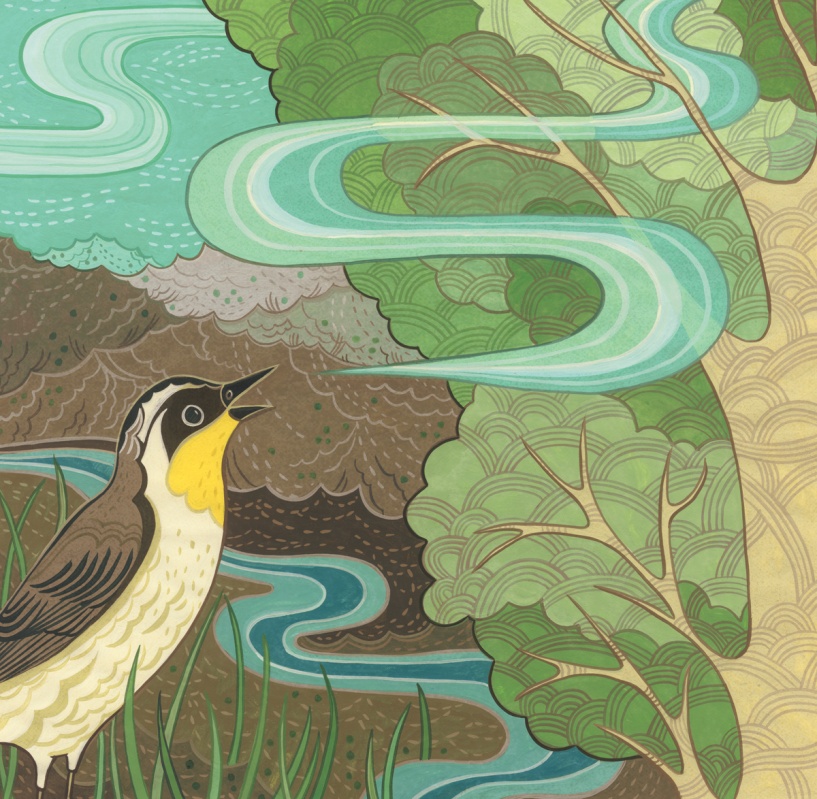I hike whenever I get the chance, and I never mind hitting the trail alone. Even though I love sharing the outdoors with family and friends, solitary hikes offer me the opportunity to tune into a place with no distractions. Alone, I can better hear nature’s sounds and enjoy more fully the rustle of wind through the trees, the splash of flowing water or the surprising thrill of a birdcall.
More and more, human-made noise muffles natural sounds. Kurt Fristrup, a National Park Service senior scientist, reports that noise pollution is growing faster than the population of the United States, doubling or tripling every 20 to 30 years. Eighty-three percent of the continental U.S. lies within six-tenths of a mile of a road, and commercial air routes pass over even remote parks. Noise intrudes even where we wouldn’t expect it.
This excess noise affects wildlife in many ways. A 2001 study found significantly higher levels of stress enzymes in elk and wolves in Yellowstone National Park whenever snowmobiles were around. (Researchers didn’t add to the animals’ stress by capturing them; they tested their scat.) Frogs are diminishing almost everywhere, and human noise is one reason. How? The creatures sing in chorus to prevent predators from drawing a bead on an individual, but when noise disrupts the chorus, predators can more easily pick off a specific singer.
Another recent study found that elevated noise reduced by one-third the number of certain bird species in parts of northern New Mexico. Excess noise interferes with reproduction for birds that use songs to defend territory and attract mates. Noise also reduces how much time birds spend eating; reduced nutrition saps their energy and can flush birds off their nests, leaving eggs and chicks vulnerable.
The movement of wind through the leaves of cottonwood trees creates a distinctive rustling that is easily recognizable. It is immortalized in the old country song “Don’t Fence Me In” as a “murmur.” The wind is a talented musician. The tune it plays on a rocky peak is as different from its whisper through tall grass as a car horn is from a French horn, and those sounds are nothing like when wind thrums thousands of pine needles in an evergreen forest.
Water is another fine instrument in nature’s symphony. It gurgles and mutters over rocks, roars over falls, plops on the dry ground as rain. Humans seem almost universally programmed to be soothed by its sound, and there is hardly anything finer than pitching camp near a healthy stream, such as the one in Garner State Park, and falling asleep to its music. And almost everyone enjoys the rhythm of waves pounding a beach, audible from campgrounds in a number of Texas parks.
This natural soundtrack is essential to our memories. My memories of Lost Maples include the rattle of dry leaves in fall and the cacophony of frog calls around a pond in spring. Recalling a hike along the Colorado River, I hear the high-pitched cry of a hawk. Thoughts of star-gazing in Palo Duro Canyon bring to mind the yip of coyotes.
Less poetic but just as important, sounds provide warning. The rumble of thunder sends a hiker scurrying from a dry wash or an exposed hill. Raindrops on the tent roof warn you to zip up the windows. A sharp rise in the wind or a sudden stillness can signal danger. Shrieking birds may mean a snake waits around the next rock, and that telltale rattle means you didn’t heed the warning and got too close.
Fristrup worries about “learned deafness,” which is what happens when we grow so accustomed to background noise that we lose the ability to appreciate the natural sound environment. He also notes that the practice of carrying our own auditory environment reduces our natural interaction with the environment, both the pleasure of natural sounds and their value as signals.
Sounds are an important part of our memories. Years from now, as I remember trekking from Davis Mountains State Park to Fort Davis, I want to remember the dramatic rocks and blue sky, not an obscure pop song unrelated to the rest of the experience.
Even worse is the unavoidable imposition of those soundtracks. Campers next to my family at Garner once hooked up a television, and I’ve been trapped between dueling boom boxes in both shady picnic areas and on the beach. The pulsing atmosphere can feel more like a downtown street or a sports bar than a beach or quiet campground.
Once, rounding a curve in the trail, I heard the whir of small, rapid wings. When I turned, I caught sight of the tiniest movement, raised my binoculars, and was rewarded with a long, rich close-up view of an iridescent hummingbird. In too many places, unnatural noise would have drowned out the delicate creature’s flutter.
——————–
Melissa Gaskill is an Austin writer who specializes in nature topics.


